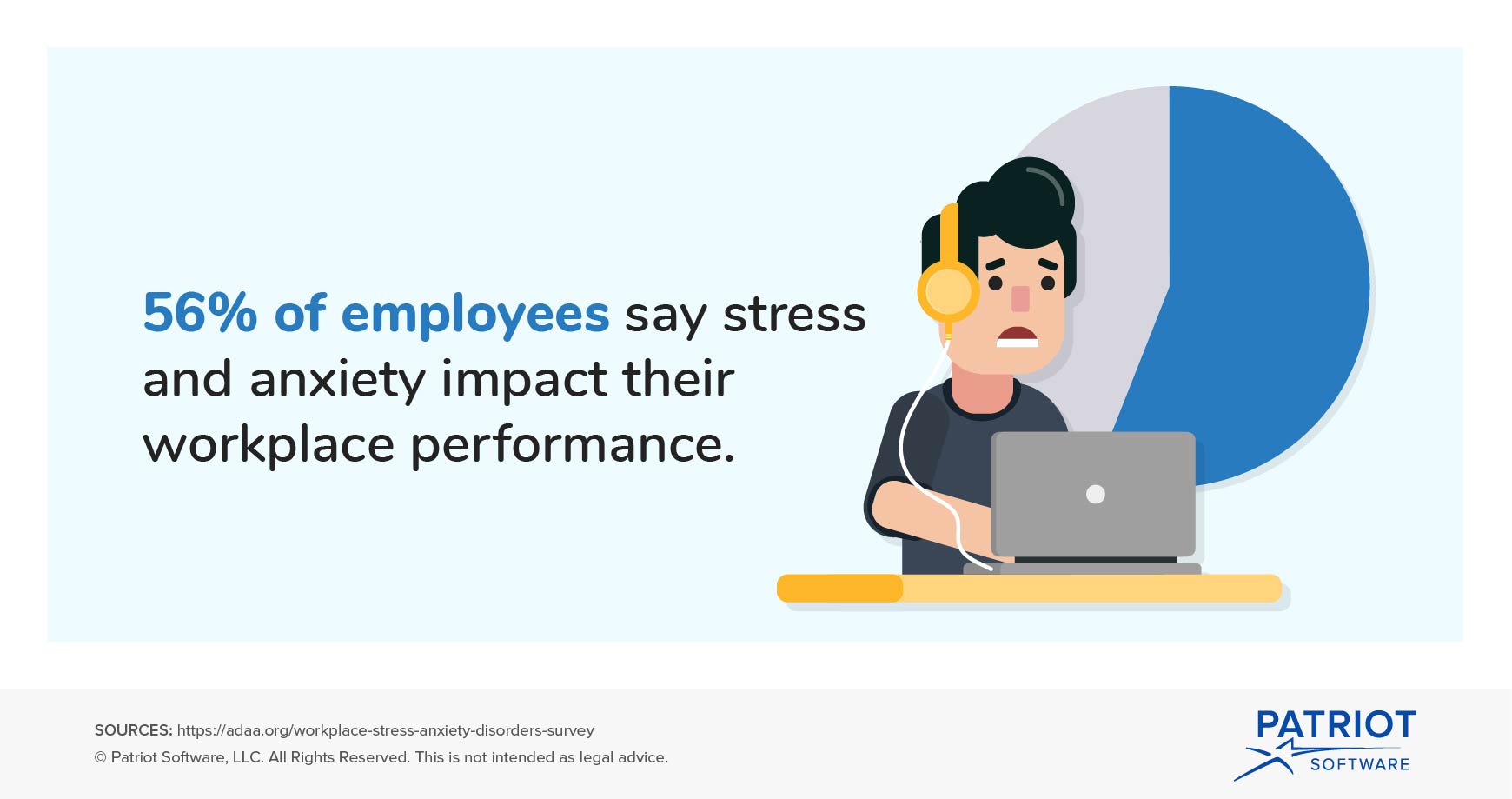Handling stress at work is critical for your (and your company’s) health. Approximately 60% of workers experience stress three or more work days per week. And, 41% of small business owners cite their companies as their top stressor.
If you don’t do something to manage work-related stress, you may notice a drop in productivity and engagement. According to one study, 56% of employees say stress and anxiety impact their workplace performance.
So, what’re you doing to keep your stress in check?
Tips for handling stress at work
Everyone handles workplace stress differently. What works for one of your employees may not have the same effect on you.

Here are some general tips on how to manage stress at work.
1. Identify your stressors
Reducing stress at work can make a world of difference in your job performance and your business’s bottom line. But, you can’t limit stress if you don’t pinpoint what is stressing you out.
Common sources of work-related stress include:
- Heavy workloads
- Negative cash flow
- Conflict
- Lack of control
- Poor work-life balance
- Personal reasons
You might be stressed about a number of things. The amount of stressors may even worry you. Take a step back and get to the root of your feelings of anxiousness.
Which stressors don’t really matter? What is stressing you out most? What made you start worrying?
Compartmentalize your stress and identify your main source of worry. That way, you can work towards tackling each stressor, one at a time.
Have you ever heard of the debt-snowball method? When someone uses this debt reduction strategy, they pay off their smallest debts first. Similarly, you could tackle your small stressors to get them out of the way (we’ll call this the stress-snowball method). Or, you may opt to take on your biggest stressor first.
2. Talk it out
Be honest with your workers if you are stressed. As the small business owner, you might think you only have yourself to rely on. But when you have employees, you can work through business-related problems with them and ask for help.
Consider hosting a meeting to talk out your workplace concerns. Try to delegate more of your responsibilities to your employees to take some workplace stress off your shoulders. If you stress about the state of your business, ask employees to contribute more.
Discussing your stress can help alleviate it. And, talking it out is especially critical when employees can help.
3. Map out a plan
Another tip for learning how to handle stress at work is to create a plan. How will you tackle your stress? You may need to adjust your goals, restructure your time, or alter your mindset.
If your stress stems from having a heavy workload, you may need to cut back. Again, you can delegate work to your employees. You might also need to shift your goals so you eliminate time wasters.
For example, you could automate some of your responsibilities if they stress you out. Tasks, like running payroll and managing your accounting books, can be streamlined with software.
4. Avoid multitasking
Multitasking is a great way to get work done faster, right? For some people, multitasking might seem like the perfect solution to eliminating stressors. But in reality, multitasking has a slew of negatives.
Not only does multitasking have the potential to hinder productivity, but it also can increase stress. One study found that the constant stream of information that people respond to while multitasking can trigger stress responses.
Try focusing on one task at a time. Determine whether this helps your stress levels or not. If it does, consider making a conscientious effort to reduce multitasking.
5. Take care of yourself
Taking care of yourself is a huge part of managing stress at work. If you don’t get enough sleep or exercise, you may find yourself more prone to anxiety.
When you get inadequate sleep, you may notice increased health problems, forgetfulness, and yes, stress. Not getting enough sleep can dramatically impact your stress levels. And if you don’t know how to reduce stress at work, you may not get the best rest. It’s a nasty cycle, isn’t it?
Exercising a few times per week is another handling stress at work strategy. Exercise is a great way to help you forget about worries and improve your mood. Go for a walk, a run, lift some weights, or do some yoga to relieve some of your workplace stress.
6. Create your own go-to de-stressor
Everyone has something that reduces worrying. Create a go-to de-stressor that you can rely on for stress management in the workplace.
Think up things that bring you joy, relaxation, and an overall sense of calmness.
Here are a few healthy examples of activities that may help with handling stress at work:
- Listening to music in the workplace
- Breathing deeply
- Taking a walk around the block
- Drinking a cup of coffee or tea
- Snacking on nutritious foods
- Talking with a loved one
Some studies also show that surrounding yourself with plants can help with dealing with stress at work. Consider adding some plants to your office to help you de-stress.
7. Recognize what you can’t control
At the end of the day, coping with stress at work might come down to breathing stress away. If you’ve exhausted all your efforts to fix what you’re stressed about, you may realize that it is out of your control.
Avoid stressing out about things that you can’t control. This is probably one of the most challenging strategies for managing stress in the workplace. But if you can breathe away unnecessary stress, you can focus on controlling the things that are within your power.



